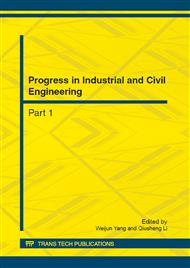p.4250
p.4254
p.4260
p.4264
p.4270
p.4274
p.4280
p.4286
p.4292
Study on the Ventilation and Dehumidification System Integration Framework for City Buildings in Hot Summer and Cold Winter Zone
Abstract:
Building ventilation has typical regional characteristics, due to its annual high wet climate characteristics in hot summer and cold winter area, the choice of ventilation type is especially important. The present building energy consumption simulation and thermal comfort evaluation of is inadequate to air humidity effects, and easily to ignore ventilation energy saving potential with building thermal environment control. In this paper based on the region annual building humidity environment characteristic, author put forward a kind of building ventilation and dehumidification integrated solutions, from a methodological point of view to explore a ventilation and dehumidification integrated technique with air conditioning and heating period , try to deal with the indoor thermal environment quality problems with lower energy consumption.
Info:
Periodical:
Pages:
4270-4273
Citation:
Online since:
October 2012
Authors:
Price:
Сopyright:
© 2012 Trans Tech Publications Ltd. All Rights Reserved
Share:
Citation:


